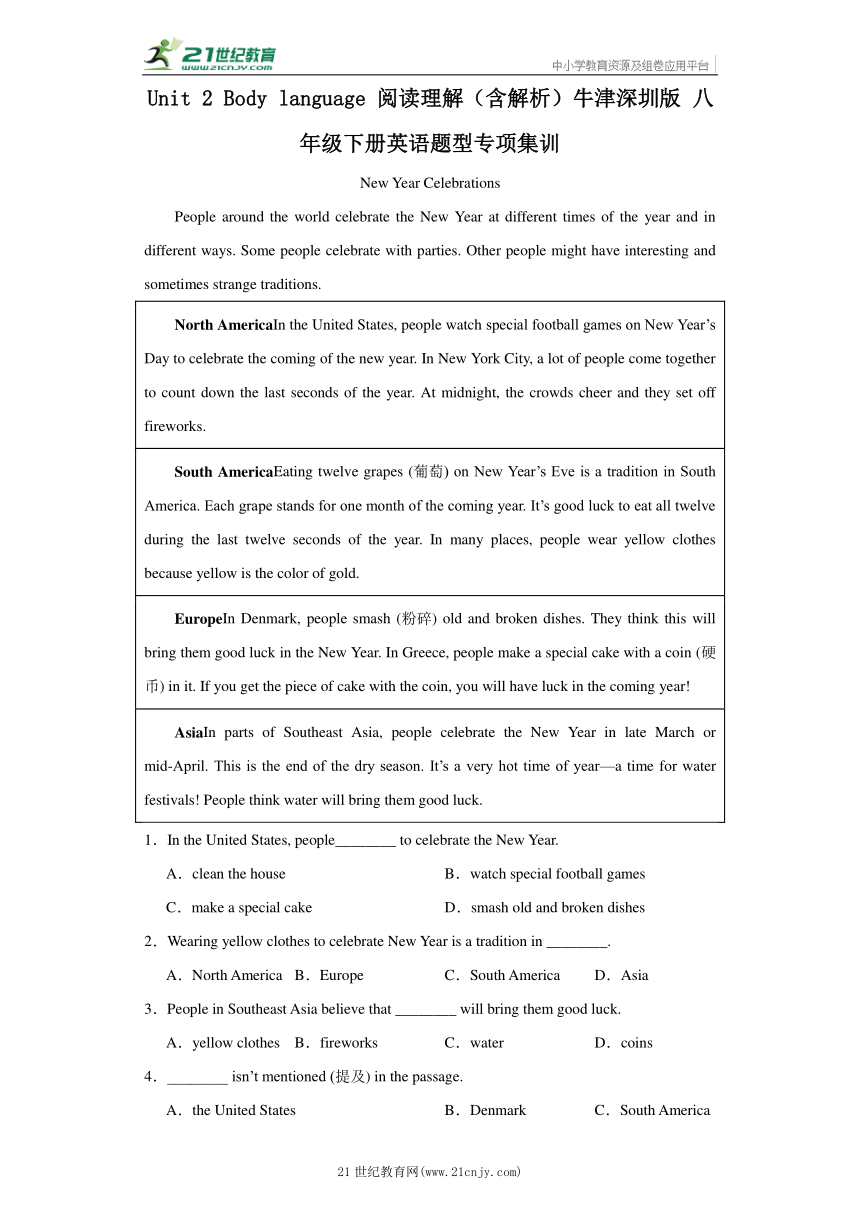
Unit 2 Body language 阅读理解(含解析)牛津深圳版 八年级下册英语题型专项集训 New Year Celebrations People around the world celebrate the New Year at different times of the year and in different ways. Some people celebrate with parties. Other people might have interesting and sometimes strange traditions. North AmericaIn the United States, people watch special football games on New Year’s Day to celebrate the coming of the new year. In New York City, a lot of people come together to count down the last seconds of the year. At midnight, the crowds cheer and they set off fireworks. South AmericaEating twelve grapes (葡萄) on New Year’s Eve is a tradition in South America. Each grape stands for one month of the coming year. It’s good luck to eat all twelve during the last twelve seconds of the year. In many places, people wear yellow clothes because yellow is the color of gold. EuropeIn Denmark, people smash (粉碎) old and broken dishes. They think this will bring them good luck in the New Year. In Greece, people make a special cake with a coin (硬币) in it. If you get the piece of cake with the coin, you will have luck in the coming year! AsiaIn parts of Southeast Asia, people celebrate the New Year in late March or mid-April. This is the end of the dry season. It’s a very hot time of year—a time for water festivals! People think water will bring them good luck. 1.In the United States, people_____ to celebrate the New Year. A.clean the house B.watch special football games C.make a special cake D.smash old and broken dishes 2.Wearing yellow clothes to celebrate New Year is a tradition in _____. A.North America B.Europe C.South America D.Asia 3.People in Southeast Asia believe that _____ will bring them good luck. A.yellow clothes B.fireworks C.water D.coins 4._____ isn’t mentioned (提及) in the passage. A.the United States B.Denmark C.South America D.China ①It’s easy to point fingers when disagreements happen. Wouldn’t it be great to avoid (避免) conflicts (冲突) with one word It’s possible. Conflicts often start and become worse by our choice of words. Words like “You are so…” or “How could you… ” are not a good choice for polite conversations. Instead, you can start with an “I” and center on your thoughts and feelings about the matter. ②Dr. Thomas Gordon used the “I-message” in the 1960s. “I-message”, also known as I-statement, is a form of sentence that can show your thoughts without making others feel down. ③I-statements enable you to express your opinion without using upsetting language. For example, “I forgot to ask you for your address after you invited me to come,” is better than “You invited me so you should have given me the address.” In this way, you avoid getting into a fight with others or directly pointing out the other person’s mistake. Also, you carefully make them realize what’s going on, showing them how the situation makes you feel. Doing so, you can finally have a meaningful, two-w ... ...
~~ 您好,已阅读到文档的结尾了 ~~

